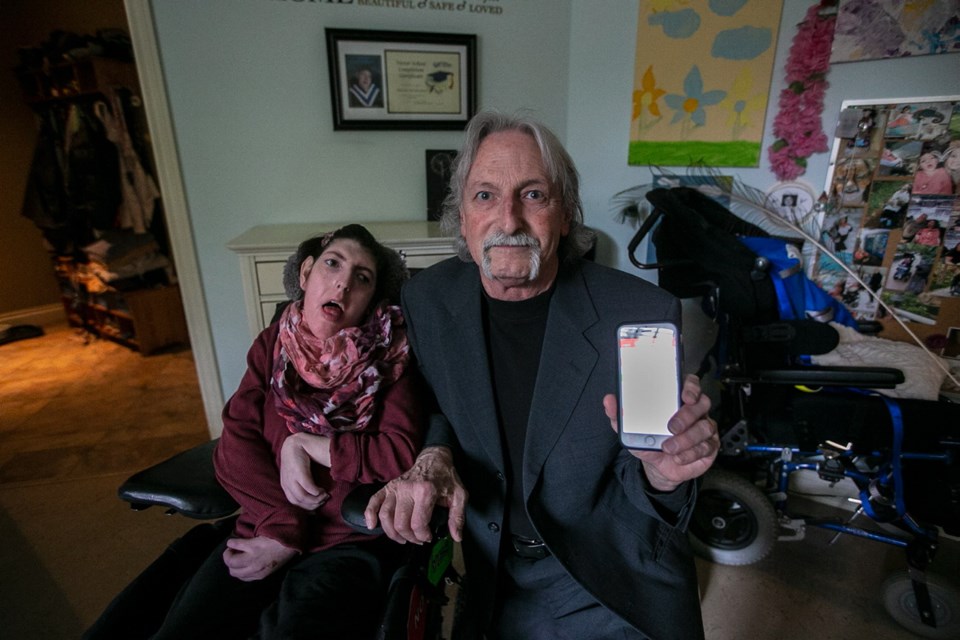Mariel McDermott spent years of discomfort and pain arising from complications of urinary incontinence while she was immobilized in a damp diaper and locked in a wheelchair.
Now Mariel’s father, Jim McDermott, has improvised a gadget that has improved his daughter’s care enormously. McDermott thinks it could improve the care of similarly disabled people by alerting caregivers when a diaper change is necessary.
“I’ve become an advocate for people with special needs,” he said in an interview at his Oak Bay home.
“I think it’s my conscience talking to me,” McDermott said. “It’s like: ‘If my daughter needs better care, then everybody should have it, too.’ ”
After an unsuccessful hunt to find anyone interested in developing his gadget as a standalone device, McDermott has a club of engineering students from the University of Victoria working to make it happen.
The members of the UVic Biomedical Engineering Design Club are working to have a prototype ready by the end of this month. Club members plan on entering it in Innovative Design for Accessibility, a national competition. The contest is open to any student or students, so long as the idea is nominated by a university faculty member.
Brent Godau, a UVic engineering master’s student and club member working with McDermott, said he and his fellow students are excited about the gadget and hugely impressed by the father’s commitment.
“Everybody in the club is really inspired by Jim,” Godau said. “He is super passionate about care for his daughter and for people in the same situation.”
Mariel McDermott was born with cerebral palsy. She is quadriplegic and seriously developmentally delayed. At 23, her care needs are equivalent to those of an infant.
McDermott and his wife, Maureen, have fitted their home with wide corridors and specially designed bathing facilities. During the day, Mariel spends her time at care facilities, first Victor School and now Wellspring.
McDermott said Mariel has always received excellent institutional care. But even the best of care could still leave her for a lengthy time in a wet diaper. As a result, she suffered regular infections to her urinary tract and breakdowns of the skin in her pelvic region.
“Her personal hygiene care was done on [the facility’s] schedule, not on hers,” he said.
“I kept on thinking there has to be something I can put in the seat of her wheelchair to tell me when she has voided her bladder so she’s not sitting for hours in a urine-soaked seat.”
After unsuccessful searches on the internet and endless questions to care experts and officials, the now-retired maintenance engineer decided he would make one himself.
“I’ve worked around temperature probes and sensors and gauges all my life,” McDermott said. “I thought if I can’t find anything, I’m going to have to make my own.”
Eventually, he found a wireless sensor tag with a phone application. Used in places such as laboratories or home wine cellars, the sensor measures humidity, temperature and even movement. It is contained in a plastic box about four centimetres square and one deep.
McDermott implanted the sensor device in Mariel’s wheelchair seat. Changes in moisture or temperature prompt an audible chirp and are downloaded to a computer tablet on the back of her chair and to Jim’s phone.
Caregivers can now hear or tell at a glance at the tablet when Mariel has emptied her bladder and if she needs to be changed. If the care team misses the chirp, McDermott sees it on his own phone and calls the facility.
McDermott said the proof of his device’s effectiveness is Mariel’s medical record. In the two years the device has been installed, she has not suffered a single urinary-tract infection or skin breakdown.
Howard Waldner, a friend of McDermott’s and the former president and CEO of Island Health, said he believes the device could not only assist caregivers with their workload and patients with their comfort, but could save nursing homes money.
“This will be also highly cost-effective, as it will prevent unnecessary changes that are a significant cost in staff time and supplies,” he wrote in an email.
But Prof. J. Brock Smith, entrepreneur specialist at UVic’s Peter B. Gustavson School of Business, was doubtful about McDermott’s device becoming a bestseller.
Smith said he thought the market was too small and specialized. It’s also not the sort of thing that could be well protected with a patent. Someone else could install a similar sensor and create a similar gadget, he said. But Smith said the device could be developed as a venture to help people.
“If the goal is not to make a lot of money and you are looking at a social venture, trying to help and improve the lives of these patients, I have to say: ‘Fabulous goal,’ ’’ Smith said.
But Shawna DeCosta, a 25-year veteran of advanced care and program director at Wellspring Support Inc., where Mariel spends five days a week, called the device “revolutionary.”
“It completely changes the way patient care can take place,” DeCosta said.
“It’s absolutely brilliant, and everybody should be using it.”



